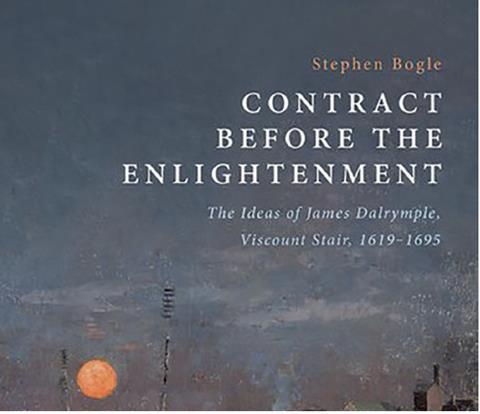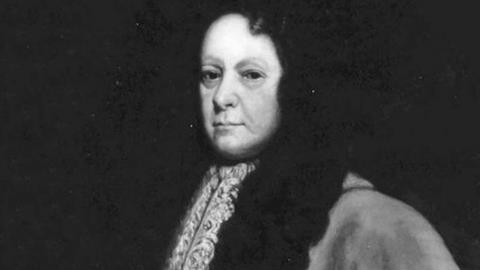
Stephen Bogle
£90, Oxford University Press
The advancement of learning is often to be found in the way seemingly irreconcilable ideas jostle together in conflict but somehow emerge in harmony. Even so, given the extraordinary levels of conflict in the 17th century, the prospects of finding such a synthesis in that era would seem bleak. Nevertheless, that is what one Scottish thinker of that century achieved, making unlikely bedfellows of the Emperor Justinian, Thomas Aquinas, Hugo Grotius, Samuel Pufendorf, and even Jesuits like Francisco Suárez.
Scotland started the 17th century as an independent kingdom but with the Union of the Crowns became part of a new nation – Great Britain.
And while England may have considered itself the senior partner in the nation created by James I and VI’s accession, it was Scottish ideas that would drive Britain into the future.
Perhaps surprisingly Scotland was slow to produce printed legal texts before the end of the century, but curiously that made the Scottish system more open to outside influence than some other jurisdictions. Stephen Bogle, a senior lecturer in private law at Glasgow University, has set out to look at how the unique features of the 17th century cultural milieu influenced one aspect of Scotland’s laws – the law of contract – through the work of one of its greatest legal thinkers, James Dalrymple, later Lord, then Viscount, Stair.
The Reformation in Scotland in the previous century had been less violent but more consistent and all-embracing than in England. But in the 17th century – as Britain became caught up in what is now referred to as the War of the Three Kingdoms – Scotland would be the nation where war started and where war would continue long after the Restoration of the House of Stuart. Throughout the century, and throughout Europe, humanity would plunge to the depths of barbarism – consider the Killing Times in Scotland or the Deluge in Poland-Lithuania – but reach extraordinary heights in the arts, philosophy and science.
Nearly halfway through the century in the February of 1648, the 29-year-old Dalrymple, a professor of mathematics, logic and ethics at Glasgow University, decided on a career change and entered the Faculty of Advocates in Edinburgh.
Dalrymple may have spent his early career as an academic, and was now turning to the law, but he was no stranger to conflict. He had fought with the Covenanters against the King’s forces in 1639.
But he showed a degree of political acumen during the Commonwealth and into the Restoration. The Scots might have handed over Charles I to parliament, but the prospect of trying the Lord’s anointed did not sit as easily for Presbyterians as it did for Puritans. Dalrymple managed to ride the crosscurrents of Commonwealth and Restoration, gaining first a role as a Commissioner of the Administration of Justice and then later both a Baronetcy and a return to the Court of Session as Lord Stair.
Stair was deeply religious, but his Presbyterianism did not stop him being open to commercial reality when it came to a systematic approach to contract law. Stair’s approach crystalised in the Institutions of the Law of Scotland, the first edition appearing in 1681.
While it may seem an unnecessary concern for a modern reader, Stair was seeking to reconcile choices made in contracting with the philosophy and theology derived from the works of another lawyer, the Genevan Jean Calvin. Stair’s intellectual milieu, and the centrality James Dalrymple fought with the Covenanters against the King’s forces in 1639 with which issues such as grace and predestination (the idea that God, knowing everything, has already selected those destined for heaven or for hell) informed all aspects of life, will seem alien to us. Stair, though, was looking forward to creating a jurisprudence for Scotland that was both rational but properly acknowledged his underlying beliefs. Calvin’s theology denied that man could act morally without God’s aid. Contrast this with alternative natural law jurists, who saw that the propensity to goodness was within every human, even after the biblical Fall of mankind.
It may seem a long way from such considerations to contract law, but it was not to the 17th century mind. Bogle has not given himself an easy task in guiding the reader through the thicket surrounding Scottish politics but has succeeded admirably.
This book is not, of course, a sweeping narrative in the style of CV Wedgwood or Peter Wilson.
This is micro-history that will appeal to those versed in Scottish contract law and curious as to its origins, or those whose interest in the 18th century enlightenment that graced Edinburgh means they have an appetite to understand the social and intellectual forces from the preceding century. Common terms like ‘liberty’ and ‘freedom’ held quite different meanings to pre-Enlightenment societies than they do today. Stair’s sources were many and varied, but Bogle’s mastery of primary and secondary material is exemplary. Bogle not only gives a compelling account of Stair’s development but also helpfully explains how Stair’s ideas fared at the hands of successors, George Mackenzie and Gershom Carmichael.
As someone steeped in English contract law, I would have appreciated a glossary of Scottish contract terms but perhaps that is simply an example of English insularity. I did wonder too, in dealing with Stair’s intellectual development and his impact on the law of Scotland, how far the back story could be ignored – both Stair’s own experiences and that of the nation. Do not forget that Stair’s Scotland, as well as participating in the War of the Three Kingdoms, was still the Scotland of clan battles, (Altimarlach, the last of these, only took place in 1680), of witchcraft trials, and was the last country in the British Isles to execute anyone for atheism (the Thomas Aikenhead case – albeit the execution did not take place until two years after Stair’s death). And, of course, as any MacDonald will tell you, it was Stair’s son, also an advocate but ultimately ennobled as the Earl of Stair, who was behind the Glencoe massacre.
However, this book is not intended as a general social history.
Instead, it provides a fascinating account of the ideas that created Scotland’s contract law. No doubt it will be a key text in that study for years to come.
Max D Winthrop is a partner at Sintons LLP in Newcastle
































No comments yet